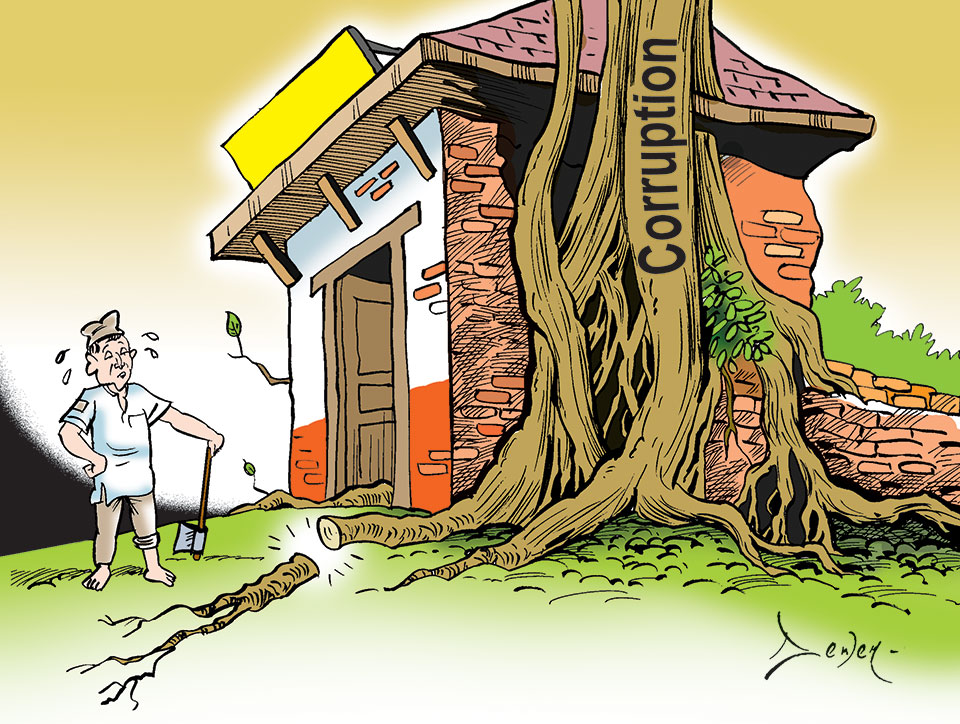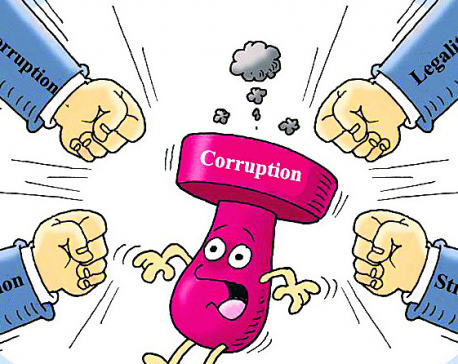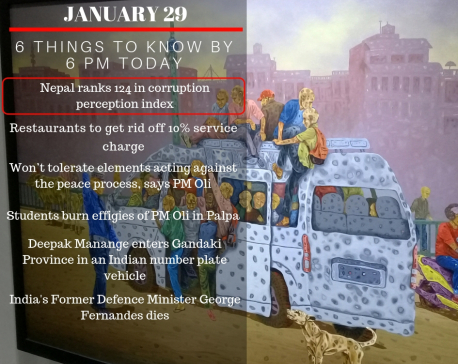
OR
Editorial
Bring policy decisions under legal jurisdiction to tame corruption
Published On: February 1, 2024 07:25 AM NPT By: Republica | @RepublicaNepal

Nepal has consistently remained in the bottom half of the list of countries where corruption is rampant. This is evident from the latest Corruption Perceptions Index (CPI) released by Transparency International (TI) on Tuesday. The CPI shows that efforts taken so far to control corruption in Nepal have failed to yield any substantial result. In the global ranking, Nepal has scored 35 points and is currently ranked 108th, which is a marginal improvement by one point as compared to last year. Nepal was ranked 110th among 180 countries and territories surveyed in the year 2022, making a slight improvement as the country climbed seven notches in global rankings a year ago. Nepal was ranked 117th in the index in 2021. The change this year, up by only one point from the previous year, is far from the transformative progress that is needed to do away with the rampant corruption in Nepal. The failure to tame corruption highlights the urgency for Nepal to take various urgent measures including doing away with the policy corruption that is so pervasive in the country in recent years.
The global landscape reveals a stark contrast in the fight against corruption, with Denmark leading the charge as the least corrupt nation. The top ten positions are dominated by countries such as Finland, New Zealand, Norway, and Singapore, exemplifying the positive correlation between stringent anti-corruption measures and a nation's prosperity. Nepal, unfortunately, finds itself on the other end of the spectrum, struggling to tame the ever increasing corruption. It is high time our policymakers recognized the grave implications of corruption at the national level. A corrupt system erodes public trust, impedes economic progress, and stifles social development. Therefore, the urgency for Nepal to address the corruption effectively cannot be underestimated. It is about safeguarding the future of citizens and fostering an environment conducive to growth and prosperity. Failure to contain corruption also poses a significant threat to socio-economic stability of the country.
One of the important concerns lately in Nepal is the growing instances of policy corruption. Transparency International (TI) Nepal has rightly emphasized the pressing need to bring policy decisions under legal jurisdiction. TI Nepal has maintained that such a measure is necessary to enhance good governance within the country. As a newspaper, we believe that the government will take this suggestion positively and formulate appropriate legislation to bring policy decisions under legal jurisdiction so that anti-graft bodies like the Commission for the Investigation of Abuse of Authority (CIAA) can investigate such cases. As TI's 29th annual corruption perceptions index aptly points out, a critical aspect of corruption is its symbiotic relationship with weakened justice systems. The lack of accountability for public officials allows corruption to thrive. Thus, addressing corruption goes beyond isolated measures; it requires a holistic approach that strengthens institutions, enhances transparency, and ensures that those who engage in corrupt practices face swift and severe consequences. We call upon the government to institute robust policies and strengthen the justice system to eradicate corruption at its roots. Only through decisive and proactive measures that also address policy corruption can we hope to do away with the endemic corruption that has hindered our progress as a nation for far too long.
You May Like This

Nepal’s Corruption Crisis
The onus also lies on the ordinary citizens to end the corruption. All citizens should demand accountability and transparency from... Read More...

Decentralization of corruption
That corruption is rampant in Nepal has been attested by Transparency International’s annual corruption perception index report. What is really... Read More...

JAN 29: 6 things to know by 6 PM today
Your daily dose of missed important news of the day. ... Read More...






Just In
- Challenges Confronting the New Coalition
- NRB introduces cautiously flexible measures to address ongoing slowdown in various economic sectors
- Forced Covid-19 cremations: is it too late for redemption?
- NRB to provide collateral-free loans to foreign employment seekers
- NEB to publish Grade 12 results next week
- Body handover begins; Relatives remain dissatisfied with insurance, compensation amount
- NC defers its plan to join Koshi govt
- NRB to review microfinance loan interest rate











Leave A Comment